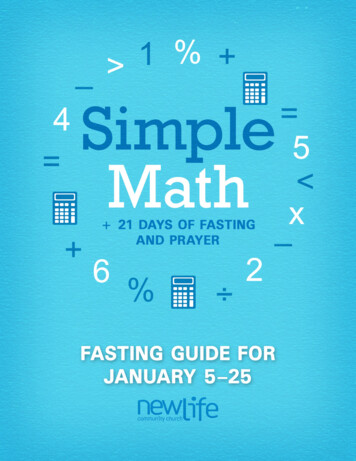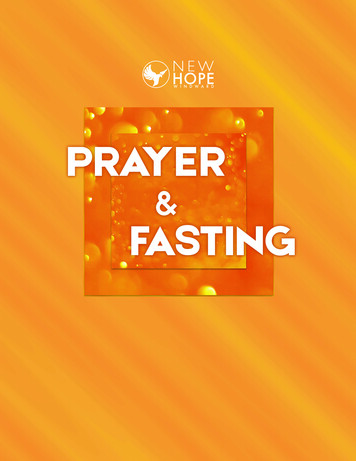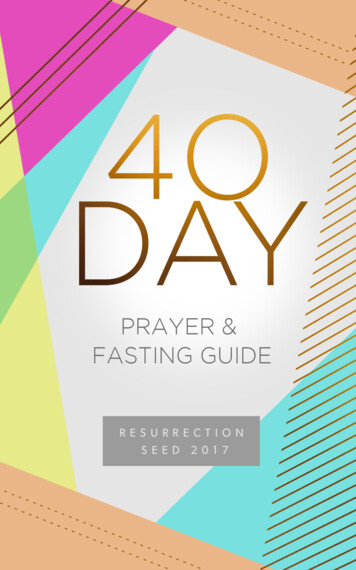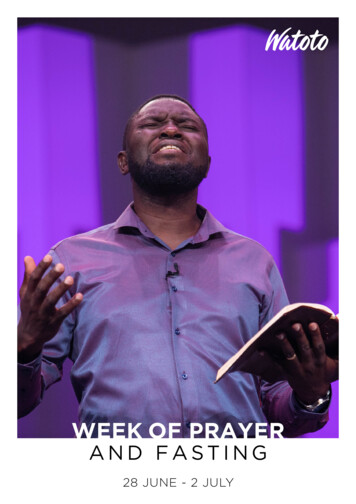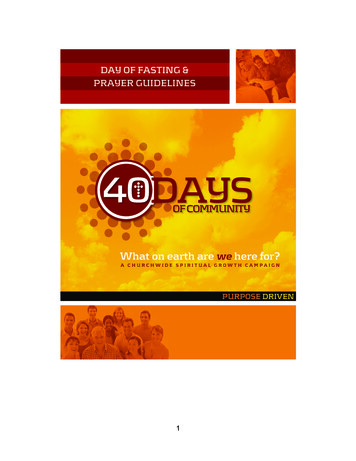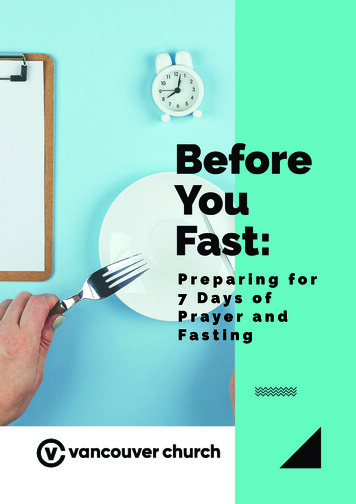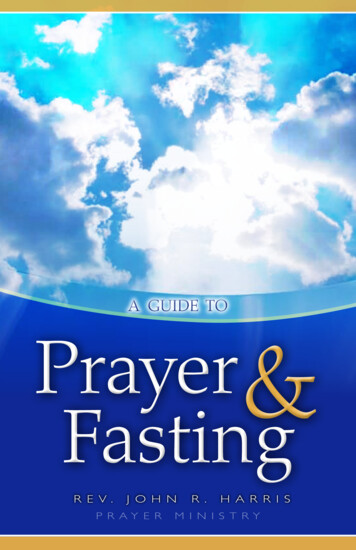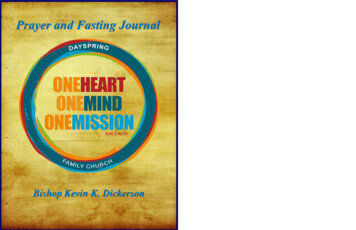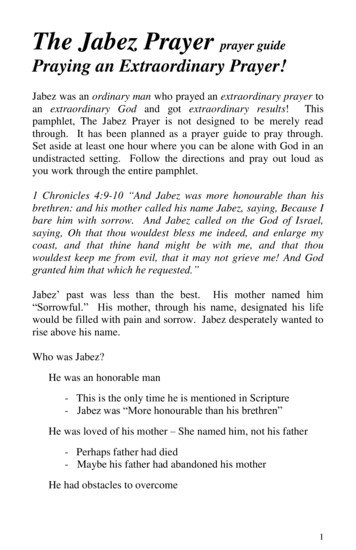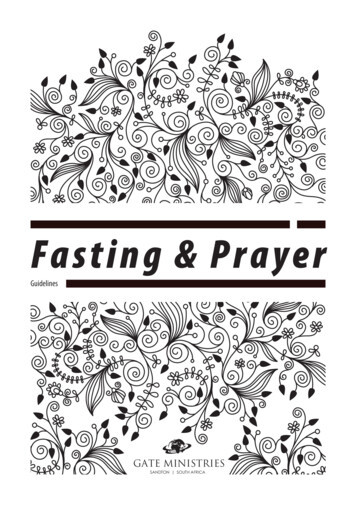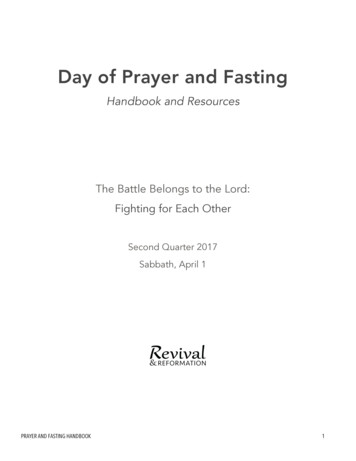
Transcription
Day of Prayer and FastingHandbook and ResourcesThe Battle Belongs to the Lord:Fighting for Each OtherSecond Quarter 2017Sabbath, April 1PRAYER AND FASTING HANDBOOK1
Prepared for church group and individual use by the General Conference of Seventh-dayAdventists in coordination with the Revival and Reformation Committee. Prepared by TamyraHorst for the Day of Prayer and Fasting global initiative.Visit www.revivalandreformation.org for information.Unless otherwise noted, Scripture is quoted from the New King James Version, copyright 1979, 1980, 1982, Thomas Nelson, Inc., Publishers.Scriptures marked NIV are taken from the Holy Bible, New International Version. Copyright 1973, 1978, 1984, 2011 by Biblica. Used by permission.Scriptures marked NLT are taken from the Holy Bible, New Living Translation, copyright 1996,2004. Used by permission of Tyndale House Publishers, Inc. All rights reserved.PRAYER AND FASTING HANDBOOK2
ContentsWhy a Day of Prayer and Fasting?4Suggested Planning Ideas5Suggested Program Format7Pointers for Prayer Leaders8Fighting for Each Other (Prayer Requests)10Continue to Fight for Each Other in Prayer12AppendixFightin’ Prayers Devotional14Praying Like Crazy20What Do I Pray About?21Are Your Children Stuck in MUCK?22The Call to Biblical Fasting24Spiritual Breakthrough30PRAYER AND FASTING HANDBOOK3
Why a Day of Prayer and Fasting?Imagine you are a parent about to leave your children, knowing you will not see them again untilthe Kingdom of Heaven. What is the most important thing you could say to them?Jesus had that dilemma as He prepared to return to heaven after His crucifixion. What was theburden of His last words to His disciples? As we read through His last prayers and counsel inJohn 15-17, we discover repeating themes: Unity, love, and seeking God through prayer. Jesuslonged for His fledgling church to come together in purpose, harmony, and mission. Today, amidperhaps unprecedented polarization in the world, our nations, and our church, we too need toheed Jesus' counsel to seek His Spirit and come together for mission. The task seems dauntingand impossible in our humanity. That's why we need to pray as never before for the miracle ofreconciliation that only God can bring.We invite you to pray "in your closet.” We invite you to pray with your local church family. Andwe invite you to the global Revival and Reformation initiative of prayer and fasting. Perhaps youwill not choose to fast totally from food. Perhaps you will fast from desserts or social media, oreat sparingly of plant-based food for a time.“Now and onward till the close of time the people of God should be more earnest, more wideawake, not trusting in their own wisdom, but in the wisdom of their Leader. They should set asidedays for fasting and prayer” (Ellen G. White, Review and Herald, Feb. 11, 1904).As you choose to focus more deeply on prayer, God will bless you and strengthen your heart forthe challenging days ahead.Cindy TutschFor Revival and Reformation CommitteePRAYER AND FASTING HANDBOOK4
Suggested Planning Ideas Key verse: James 5:16 Suggested sermon theme or possible topics for church:We’re All in This TogetherThe Great Controversy and the ChurchThe Battle, the Church, and God’s PeopleThe Battle Belongs to the Lord Suggested children’s story:Share the story of Nehemiah 4. While the people were working to rebuild the walls, theenemy tried to stop them. So Nehemiah had the people help each other. Some wouldbuild while others protected the builders. They would stand guard all day long (verse22). Because they were spread out so far around the city, they devised a plan: whenone group was being attacked, they’d sound the trumpet, and everyone would rushover to help (verses 19, 20). With everyone working together and taking care of eachother, they were able to rebuild the walls in 52 days, and all their enemies saw that Godwas with them.To make the story more fun, you can have the kids build a wall—but each child can onlyuse one hand and everyone has to work together. Or, to make it more realistic, haveseveral children attempt to build a wall while others come and try to keep them fromaccomplishing their task. Ask them how hard it is to build when someone keeps tryingto stop you. Then have them try again, but this time have some children stand guard sothat those attempting to stop the work can’t get to them. Finally, ask how hard it was tobuild with someone helping. Point out that hard things are always easier when we helpeach other. [Disposable cups are an inexpensive “building material.”] Prayer theme for 2nd quarter Day of Prayer and Fasting is “Fighting for Each Other.”Also pray for World Church Prayer Requests. Suggested afternoon program and activity: Schedule about two hours for this time, butallow the Holy Spirit to lead. Many groups plan on prayer for a full afternoon. Day of Prayer and Fasting devotional: “Fightin’ Prayers.” This could be shared beforethe prayer time or used with the sermon, if desired. Additional fasting information and other prayer resources are available in the appendix.PRAYER AND FASTING HANDBOOK5
Things to keep in mind regarding fasting:While not everyone is able to skip food, encourage those who can to fast from something duringthe morning and afternoon of this special day.Possible types of fasting could include: water fast, juice fast, Daniel’s fast, dessert/or rich foodsfast, social media fast, etc. Encourage members to pray and ask God to indicate what type of fastHe wants them to undertake.While fasting is a “given” in the Bible (see Matt. 6:16), we must remember that fasting is not amagic key to righteousness or blessings, nor is any other spiritual discipline we undertake. Wecan’t earn God’s blessing or answers in prayer by fasting any more than we can earn our ownsalvation. Also, fasting doesn’t substitute for obedience or personal surrender and Christ-likelove. In fact, we are told, “Fasting or prayer that is actuated by a self-justifying spirit is anabomination in the sight of God” (Ellen G. White, The Desire of Ages, p. 280).However, even if people choose not to fast, we don’t want to discourage them from being partof the day’s prayer activities. Remember, God knows the heart, and the decision to fast or not tofast (or how to fast) should be between a person and God, not dictated by anyone.The whole purpose of the Day of Prayer and Fasting is to lay self aside as we intercede for others.As we seek the Lord with humility of heart, and as we put away earthly distractions, we will have amore receptive frame of mind to what God wants to do in our life and through our prayers.As Pastor Derek Morris says, “We fast from the world so we can feast on Jesus!”PRAYER AND FASTING HANDBOOK6
Suggested Program FormatPlace: Gather together in the church sanctuary to begin this time of prayer.Introduction: After a few songs to set a reverent atmosphere, have the song leader leadeveryone in the hymn “The Church Has One Foundation” (Adventist Hymnal, #348).Follow with this Scripture: “Confess your trespasses one to another, and pray for oneanother, that you may be healed. The effective, fervent prayer of a righteous man availsmuch” (James 5:16).Opening Prayer and Official Welcome: Have the Prayer Ministries director or adesignated leader welcome everyone to the time of prayer. Share the “Fightin’ Prayers”devotional if it has not already been used during the church service. Then go over theprayer theme for the Day of Prayer and Fasting. You’ll find this on page 10. If possible,you might print up multiple copies of this section for people to have during the prayertime. This might also be a good time to remind people to keep each prayer brief, so thatmultiple people can pray.Prayer Time: Two hours minimum. This time will go quickly. Many enjoy spending the wholeafternoon in prayer. Keep the focus and emphasis on actual time in prayer. This is the day topray! The time will go quickly.Closing: In closing the prayer time, sing a few songs of praise, thanking God for what He’sgoing to do. Encourage members, even after the Day of Prayer and Fasting is over, to continueto pray for people of other faith groups in their community and to seek for ways to reach out tothem.Ending the Day of Prayer and Fasting: Have a special potluck supper or evening meal tobreak the fast together as a church family.PRAYER AND FASTING HANDBOOK7
Pointers for Prayer LeadersWhile people are encouraged to pray multiple times, remind them of the importance of keepingtheir individual prayers brief. Ellen White writes: “Make short prayers in meetings, and lengthyprayers when you talk and commune with God in your closet” (Ellen G. White, ManuscriptReleases, vol. 10, p. 130). So, while the prayer time can be long, the individual prayers should notbe. Praying short prayers tends to keep the prayer time active and moving. It also binds themembers’ hearts together and keeps adults and children from growing restless.We encourage you to start with a time of praise and confession before beginning to reallyintercede for the prayer themes. Based on Psalm 100:4, we are to enter God’s gates with praise.And, based on Psalm 66:18 and Isaiah 59:1, 2, if we want God to hear our prayers, our sins mustbe confessed and put away!If starting with praise and confession, you might begin the prayer time as follows: “Dear Lord, wecome before You today with hearts full of praise. Before we give You our requests for ourbrothers and sisters of other faiths, we want to take a few minutes just to praise Your name.Thank You for being our mighty King and deliverer.”Then allow others to pray. If you’re going to divide up your group to pray, begin this timetogether as one large group. Then separate into smaller prayer bands. When it’s time to move toconfession, lead again.We encourage a brief time for private confession to God first, and then corporate confessionespecially for sins like apathy and lethargy in reaching souls for Christ. This time of confessionmight be followed with singing “Amazing Grace.”As you pray for people, encourage everyone, by your own example, to pray God’s Word,claiming His promises. Be specific! Pray in faith! And allow this time to go as long as the HolySpirit leads.Feel free to interject, throughout the prayer time, well-known hymns and songs that correspondwith the prayers being prayed. “As a part of religious service, singing is as much an act ofworship as is prayer. Indeed, many a song is prayer” (Ellen G. White, Education, p. 168).Encourage the group to agree with each other in prayer, claiming Matthew 18:19.These are ideas to help get started, but it’s most important that the Holy Spirit leads!PRAYER AND FASTING HANDBOOK8
Spend the afternoon praying for the members of your church—praying together for those inattendance and also praying for those who are not there. Take your church membership list andprint it off. Depending on how large it is, you may want to divide your group into smaller prayerteams, giving each group a few names to pray for. If your church is small, then pray together forall of the names.You may want to create a slip of paper with each member and/or family name. You can letmembers know ahead of time that you will be praying for every church member and invite themto share specific requests that they would like to have lifted in prayer. Include these requests onthe slips of paper. Then encourage those in the prayer session to take the slips of paper homeand send a short note, postcard, or email, letting people know they were prayed for specifically.It could be helpful to divide the names into several groups: active/attending members, missingmembers who are no longer attending because of their own choices, shut-in members who areno longer attending because of health/age, and children/youth/young adults. Give names ofmembers and any specific requests to those praying. Or have the slips of paper in abasket/container and have each prayer warrior draw out a name and pray for it.Please remind people that prayer is not a time for “holy gossip.” No sharing of “concerns” orinformation that isn’t public knowledge.End this afternoon of prayer by coming back together and spending time in thanksgiving andpraise.For more pointers on leading group prayer, you can download Praying for Rain: A MiniHandbook for United Prayer at www.revivalandreformation.org.PRAYER AND FASTING HANDBOOK9
Fighting for Each OtherPrayer RequestsA. Members. Pray specifically for every member and each person attending your church. If therearen’t specific requests, some areas to pray about include: Spiritual growth/relationship with God Health Relationships—marriage, parenting, friendships Finances Jobs/school Challenges and struggles Temptations/battle with sin Passion and purpose—that each one would find their way to serve GodB. Missing Members. Pray specifically for the missing members—those who are no longerattending by choice. Pray not only for the areas listed above, but pray specifically for their relationship with God andwith the church. Ask God to heal any wounds they’ve felt inflicted by the church or church members. Pray that God will give them the desire to come back to church or to find a church in their newcommunity.C. Church. Pray for your church to be an accepting, grace-filled church where every person, nomatter where they are in their journey with God, will feel welcomed and wanted.D. Shut-Ins. Pray for the shut-in members of the church. This can be a difficult time in life forpeople. They may feel forgotten and like they have no purpose. Pray for the areas above, but pray specifically for their health. Ask God to help them find purpose and passion even with their limited abilities and to showthem ways they can continue to serve Him. Ask Him to help them feel encouraged that they aremaking a difference even if they can’t be as active as they may have once been. Ask Him to help them feel connected to Him and to the church. Pray for ideas and opportunities to minister to this group of people who may have once been avital part of the church and are now feeling forgotten. Ask God to raise up those who will visit and care for these members.PRAYER AND FASTING HANDBOOK10
E. Young People. Pray specifically for the children, youth, and young adults of the church. Young people are choosing to leave the church, thinking it is not a relevant part of their livesand not a way for them to make a difference (Barna). While praying for the areas above, pray specifically for their salvation. Pray that God protects them from all harm—not just physical but also emotional, mental, andespecially spiritual. Pray for a passion and love for God that will not end. Pray that they experience a personal and intimate relationship with Christ. Pray that church isn’tjust a habit but a place where they find people who truly care about them, where they findcourage and help in their day-to-day lives, and where they discover ways to serve God withtheir unique gifts and abilities. Ask God to convict you of ways that the church is failing or letting down young people. AskHim to show you ways to connect with the kids, teens, and young adults of your church.F. Leaders. Specifically pray for the leaders of your church. The enemy works extra hard to takeout leaders and those serving in ministry. Pray for their protection—again, not just physical but also spiritual, emotional, and mental. Pray for courage and strength as they face temptations. Pray for their relationship with God, that it will always be their top priority and that they willnever be too busy for time with God, for they can do nothing without this connection. Pray for wisdom and discernment as they lead. Pray that the church will be encouraging and not critical. Pray that even in those moments whena leader needs to be talked to about something, that it is done with much love and prayer.In addition, please remember World Church Prayer Requests: Notably, we ask that you uplift the millions of unreached people living in the large cities of theworld. Please pray that God will raise up workers: medical missionaries, church planters, and urbanmissionaries to reach these people. Pray for the Holy Spirit to work through our various ministries and services such as AdventistDevelopment and Relief Agency (ADRA), Adventist World Radio (AWR), Adventist-laymen’sServices and Industries (ASI), and others to reach the unreached. Pray for personal revival and reformation and for a sense of our own mission. Pray for children who attend our schools and for those who attend public campuses around theworld. May they find courage to stand for right and witness for truth. Pray for our families across the world, that they may be a light in their neighborhoods, givinghope and peace to those who are abused or abandoned.PRAYER AND FASTING HANDBOOK11
Continue to Fight for Each Other in PrayerThere is something powerful about hearing another person pray for you—really pray for youand the things that are the heaviest on your heart. It’s also incredibly encouraging to know thatothers are praying for you. Let’s not just pray for each other one day a year. Here are someideas for keeping members praying for each other throughout the year: Provide ways people can share prayer requests whenever there is a need:o Have a prayer request box where members can drop off specific requests. Thenmake sure to have people praying for those requests.o Include a prayer request slip of paper in the pew racks that people can fill out andplace in the offering plate. Then make sure to have people praying for thoserequests.o Have a prayer request page on your website where people can submit prayerrequests—and again, make sure someone is following up and praying.o Create a private prayer group on Facebook (make sure it’s private so that onlythose in the group can see it) where church members can share requests and“pray” for each other by posting a short prayer for the requests shared.Create a prayer room at church that is open on Sabbath—a place where people can goand have someone pray with them. Staff it throughout Sabbath morning and for a shorttime after church. Remind people that someone is available to pray with them.Each week, focus on a different family/couple/single of the church for whom to pray.Encourage people not only to pray for this member(s) during the week but also to dropthem a note, email, text, or Facebook post letting them know prayers are being lifted forthem. Make sure to include inactive or shut-in members on this prayer focus schedule.Create a MUCK group for your church—Mothers United in Christ for Kids. This is a groupof moms committed to praying specifically for the salvation of children—no matter howyoung or old they are. Share the list of children’s names with all who have committed topray. Encourage moms to share updates with the group regularly.Share the resource (in the appendix) “Praying Like Crazy” with prayer warriors andencourage them to continue praying for others.PRAYER AND FASTING HANDBOOK12
APPENDIXPRAYER AND FASTING HANDBOOK13
”Fightin’ Prayers”Devotional Thought for Day of Prayer and FastingLife can be hard.We face challenges and struggles that can seem overwhelming. Finances. Health. Relationships.Battles with sin and temptations. Loneliness.It surprises us sometimes.We want life to be easy. Things to work out. Bills to be paid. Good health. Friendships to last.Our spouse and/or children to always love us and love God. Victory over temptation.Part of the problem is that we forget. We forget that the Great Controversy is more than just thename of a book on our shelf. It is our life. The daily battle we live in.The Bible warns us. Jesus told His disciples that “the thief . . . [comes] to steal, and to kill, and todestroy” (John 10:10). We tend to skip that part of the verse and go right to “I have come thatthey may have life, and that they may have it more abundantly.” We want that abundant life. Wedon’t want to think about having an enemy who is constantly and persistently out to destroy us (1Peter 5:8).As Nehemiah and the Jews began work on rebuilding the wall of Jerusalem, they probablyhoped to get to the task, have it go smoothly, quickly, and easily, and see the walls back up andprotecting the city.But that’s not what happened.As soon as they began working on the wall, their enemies became angry. “But it so happened,when Sanballat heard that we were rebuilding the wall, that he was furious and very indignant,and mocked the Jews” (Nehemiah 4:1). Sanballat’s attacks on the Jews are some of the sameattacks we each face today as we attempt to live the lives God created us to live and do whatHe’s called us to do.“What are these feeble Jews doing? Will they fortify themselves? Will they offer sacrifices? Willthey complete it in day?” (verse 2).PRAYER AND FASTING HANDBOOK14
Attack #1: You don’t have what it takes.Sanballat questioned the Jews’ ability to complete the task. Our enemy does the same thing. Hetempts us to believe that we don’t have what it takes. He wants us to believe that we can’t so wewon’t. Won’t accomplish what God has called us to do. Won’t stand up against temptation.Won’t reach out to others in friendship to share Christ.But Sanballat wasn’t done. “Whatever they build, if even a fox goes up on it, he will break downtheir stone wall” (verse 3).Attack #2: It won’t work.Next Sanballat suggested that their attempts at rebuilding were pointless because nothing theydid would work or last. Even a fox would be able to knock down their walls. The message: youdon’t have what it takes, and whatever you do won’t work. Sound familiar? Our enemy attemptsto discourage us by convincing us that nothing we do will work. It’s pointless. We can try and try,but we won’t make any lasting difference.Sanballat’s words didn’t make much of an impact on the Jews. “So we built the wall, and theentire wall was joined together up to half its height, for the people had a mind to work” (verse 6).The people focused on their task and ignored Sanballat’s attacks. How were they able to keepbuilding and believing that God would help them complete the wall? They prayed. They toldGod about their enemies and asked God to take care of them (verses 4, 5). Note that theyprayed together, “Hear O our God, for we are despised . . .” (emphasis supplied). They were inthis together and would pray together against the enemy.When their enemies saw that the work was progressing and the walls were being restored, “theybecame very angry, and all of them conspired together to come and attack Jerusalem and createconfusion” (verses 7, 8).Attack #3: Overwhelm them.Have you ever felt like everything was working against you? Like everything that could go wrongwas going wrong? Have you faced so many battles at once that you didn’t know which one tofight first? Like Sanballat, Tobiah, and the others, our enemy loves to overwhelm us with whatfeels like more than we can handle.The Jews again turned to God. “Nevertheless we made our prayer to our God, and because ofthem we set a watch against them day and night” (verse 9, emphasis supplied). They had peoplewatching day and night. We, too, can persist in prayer against the enemy day and night.PRAYER AND FASTING HANDBOOK15
The enemy is relentless. If he can’t take you out one way, he’ll try another. The Jews’ adversariesdidn’t give up. They just tried a different tactic. “They will neither know nor see anything, till wecome into their midst and kill them and cause the work to cease” (verse 11).Attack #4: Make it subtle.They wouldn’t see it coming. They wouldn’t recognize it as an attack. Our enemy likes to do thattoo. He attacks subtly so we don’t recognize him as the enemy. He slowly leads us to make tinychoices that lead us away from God—but we don’t realize it at first. He causes us to believethings about ourselves and who we are that aren’t true—but it feels like the truth. And He alsosubtly lies to us about God, about His love and forgiveness, about His grace and salvation, inways that cause us to doubt God or His goodness.But it wasn’t just their enemies who attacked the Jews. They were also making the rebuildinghard for each other. Many were struggling to put food on the table and pay back the moneythey borrowed from their leaders in order to be free. These leaders were demanding “usury”(Nehemiah 5:7). They loaned money to those coming back from captivity, taking advantageof their need while enriching themselves. The returning captives were struggling to makeends meet and rebuild the wall and their lives—and the leaders were making it even harder.Attack #5: Friendly warfare.It’s not just enemy attacks that cripple our hearts. Many times the attacks of friends hurt evenmore. Criticism. Judgment. Misunderstanding. Betrayal. The wounds of a friend cut deeply.Nehemiah became very angry when he found out what was happening. He immediatelyreprimanded the leaders: “According to our ability we have redeemed our Jewish brethrenwho were sold to the nations. Now indeed, will you even sell your brethren?” (verse 8).Nehemiah’s words silenced the leaders. He challenged them to fear God and to restoreeverything to the Jews, along with a portion of the interest they had charged. And they did.Despite all the attacks, the Jews finished rebuilding the wall in only 52 days. “And ithappened, when all our enemies heard of it, and all the nations around us saw these things,that they were very disheartened in their own eyes; for they perceived that this work wasdone by our God” (Nehemiah 6:16).How were they able to accomplish so much in so little time despite such huge obstacles?They fought for each other.PRAYER AND FASTING HANDBOOK16
Battle plan #1: Fight for your family.The first step in Nehemiah’s battle plan had families working together and protecting eachother. “Therefore I positioned men behind the lower parts of the wall, at the openings; and Iset the people according to their families, with their swords, their spears, and their bows. . . .‘Do not be afraid of [the enemy]. Remember the Lord, great and awesome, and fight for yourbrethren, your sons, your daughters, your wives, and your houses’” (Nehemiah 4:13, 14).Our first battle plan, before anything else, should be to pray and fight for our family. Oursons. Our daughters. Our spouses. Those who live in our homes.Battle plan #2: Fight for each other.Next, Nehemiah assigned half the people the job of rebuilding the wall while the other halfguarded them. “So it was, from that time on, that half of my servants worked at construction,while the other half held the spears, the shields, the bows, and wore armor” (verse 16).Imagine how our churches would change if we worked together like this. People praying forthose who were working and serving God. People praying for Sabbath School teachers asthey taught classes. People praying for those going out and giving Bible studies. A prayerteam fighting for those attending an evangelistic series and praying for power and authorityfor those teaching. Prayer warriors consistently and persistently praying for the pastor andleaders of the church. Members praying for each other throughout the week.Nehemiah also recognized the need for leaders to pray for the people.Battle plan #3: Praying Leaders.“And the leaders were behind all the house of Judah” (verse 16). The leaders supported thebuilders and protectors by being right there behind them, fighting with them and for them.Earlier in the Old Testament, Samuel also recognized that he had a responsibility to pray forthose God had put under his care. He considered it sin if he didn’t. “Morever, as for me, farbe it from me that I should sin against the Lord in ceasing to pray for you” (1 Samuel 12:23).As leaders, we have a responsibility to pray for those God has called us to lead.Nehemiah also made sure each person was armed and ready for battle.PRAYER AND FASTING HANDBOOK17
Battle plan #4: Believe there is an enemy and be prepared for battle.“Those who built on the wall, and those who carried burdens, loaded themselves so that withone hand they worked at construction, and with the other held a weapon. Every one of thebuilders had his sword girded at his side as he built” (Nehemiah 4:17, 18). They worked,aware that there was an enemy set on destroying them. And they worked alert, prepared andready for battle.God encourages us to do the same. “Above all else, guard your heart” (Proverbs 4:23, NIV).Peter writes, “Stay alert! Watch out for your great enemy, the devil. He prowls around like aroaring lion, looking for someone to devour” (1 Peter 5:8, NLT).So the people worked. Fighting for their families. Fighting for each other. The leaders hadtheir backs. And they were prepared and alert and watching. They knew they had an enemyand were watching for their attacks. But Nehemiah also recognized that the people couldfight best when they all fought together.Battle plan #5: Rally together to fight for each other when the battle rages.“Then I said to the nobles, the rulers, and the rest of the people, ‘The work is great andextensive, and we are separated far from one another on the wall. Wherever you hear thesound of the trumpet, rally to us there. Our God will fight for us’” (Nehemiah 4:19, 20). Whenone group or person was attacked, the trumpet would sound and everyone dropped whatthey were doing and came together to fight.Too many of us try to go it alone when we’re fighting a battle. We don’t let other peopleknow. We don’t ask for prayer. We don’t admit that we’re even struggling. We smile and saywe’re fine, even when we’re not. Too many times, we assume everyone else has it alltogether. We’re the only ones struggling. No one else loses the battle with temptation. Noone else has a marriage that is barely holding on. No one else feels like a failure as a parent.Everyone else has a dynamic prayer life and loves
Ellen White writes: "Make short prayers in meetings, and lengthy prayers when you talk and commune with God in your closet" (Ellen G. White, Manuscript Releases, vol. 10, p. 130). So, while the prayer time can be long, the individual prayers should not be. Praying short prayers tends to keep the prayer time active and moving. It also binds the
